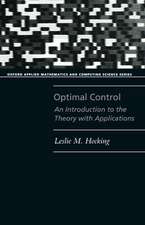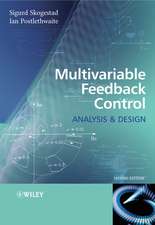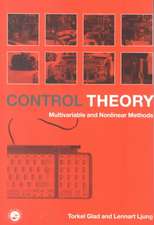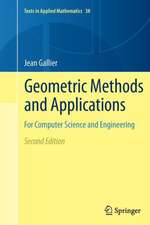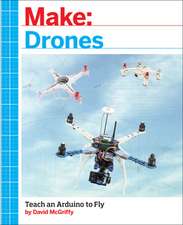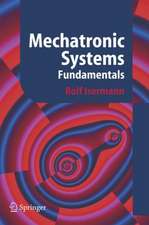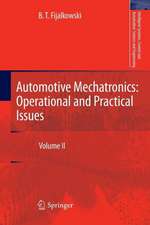Evolution of Communication and Language in Embodied Agents
Editat de Stefano Nolfi, Marco Mirollien Limba Engleză Paperback – 22 noi 2014
The contributions explain the theoretical and methodological foundations of the field, and then illustrate the scientific and technological potentials and promising research directions. The book also provides descriptions of research experiments and related open software and hardware tools, allowing the reader to gain a practical knowledge of the topic.
The book will be of interest to scientists and undergraduate and graduate students in the areas of cognition, artificial life, artificial intelligence and linguistics.
| Toate formatele și edițiile | Preț | Express |
|---|---|---|
| Paperback (1) | 988.48 lei 6-8 săpt. | |
| Springer Berlin, Heidelberg – 22 noi 2014 | 988.48 lei 6-8 săpt. | |
| Hardback (1) | 888.57 lei 38-44 zile | |
| Springer Berlin, Heidelberg – 14 dec 2009 | 888.57 lei 38-44 zile |
Preț: 988.48 lei
Preț vechi: 1235.60 lei
-20% Nou
Puncte Express: 1483
Preț estimativ în valută:
189.16€ • 196.29$ • 158.11£
189.16€ • 196.29$ • 158.11£
Carte tipărită la comandă
Livrare economică 15-29 martie
Preluare comenzi: 021 569.72.76
Specificații
ISBN-13: 9783642424991
ISBN-10: 3642424996
Pagini: 328
Ilustrații: XI, 313 p.
Dimensiuni: 155 x 235 x 17 mm
Greutate: 0.46 kg
Ediția:2010
Editura: Springer Berlin, Heidelberg
Colecția Springer
Locul publicării:Berlin, Heidelberg, Germany
ISBN-10: 3642424996
Pagini: 328
Ilustrații: XI, 313 p.
Dimensiuni: 155 x 235 x 17 mm
Greutate: 0.46 kg
Ediția:2010
Editura: Springer Berlin, Heidelberg
Colecția Springer
Locul publicării:Berlin, Heidelberg, Germany
Public țintă
ResearchDescriere
This field of research examines how embodied and situated agents, such as robots, evolve language and thus communicate with each other. This book is a comprehensive survey of the research in this emerging field.
The contributions explain the theoretical and methodological foundations of the field, and then illustrate the scientific and technological potentials and promising research directions. The book also provides descriptions of research experiments and related open software and hardware tools, allowing the reader to gain a practical knowledge of the topic.
The book will be of interest to scientists and undergraduate and graduate students in the areas of cognition, artificial life, artificial intelligence and linguistics.
The contributions explain the theoretical and methodological foundations of the field, and then illustrate the scientific and technological potentials and promising research directions. The book also provides descriptions of research experiments and related open software and hardware tools, allowing the reader to gain a practical knowledge of the topic.
The book will be of interest to scientists and undergraduate and graduate students in the areas of cognition, artificial life, artificial intelligence and linguistics.
Cuprins
A Synthetic Approach to the Study of the Evolution of Communication and Language.- Theoretical Aspects of Communication and Language.- Artificial Organisms with Human Language.- Evolution of Language as One of the Major Evolutionary Transitions.- Strategic Aspects of Communication.- Theoretical Tools in Modeling Communication and Language Dynamics.- Emergence of Scale-Free Syntax Networks.- Evolution of Communication.- Evolving Communication in Embodied Agents: Theory, Methods, and Evaluation.- Evolutionary Conditions for the Emergence of Communication.- Producer Biases and Kin Selection in the Evolution of Communication.- Evolution of Signaling in a Multi-Robot System: Categorization and Communication.- Evolution of Implicit and Explicit Communication in Mobile Robots.- Evolving Communication in Embodied Agents: Assessment and Open Challenges.- Evolution of Language.- Modeling The Formation of Language in Embodied Agents: Methods and Open Challenges.- Modeling the Formation of Language: Embodied Experiments.- Mathematical Modeling of Language Games.- Modeling the Formation of Language in Embodied Agents: Conclusions and Future Research.- Conclusion.- Embodied and Communicating Agents: Towards the Establishment of a Solid Theoretical and Methodological Framework.- Appendix: Software and Hardware Tools.- Evorobot*.- E-puck.- Babel.
Recenzii
From the reviews:
“One of the most challenging problems in human cognition is the origin of language. … The editors of this book have brought together two communities of researchers to record the current state of the research agenda and report some recent advances. … This volume is a fascinating summary of the state of the art in a challenging area of research. It serves as a sobering reminder of how far we are from a consistent bottom-up explanation of the wonder of human language.” (H. Van Dyke Parunak, ACM Computing Reviews, December, 2010)
“One of the most challenging problems in human cognition is the origin of language. … The editors of this book have brought together two communities of researchers to record the current state of the research agenda and report some recent advances. … This volume is a fascinating summary of the state of the art in a challenging area of research. It serves as a sobering reminder of how far we are from a consistent bottom-up explanation of the wonder of human language.” (H. Van Dyke Parunak, ACM Computing Reviews, December, 2010)
Caracteristici
This field of research examines how embodied and situated agents, such as robots, evolve language and thus communicate with each other.
Includes supplementary material: sn.pub/extras
Includes supplementary material: sn.pub/extras

